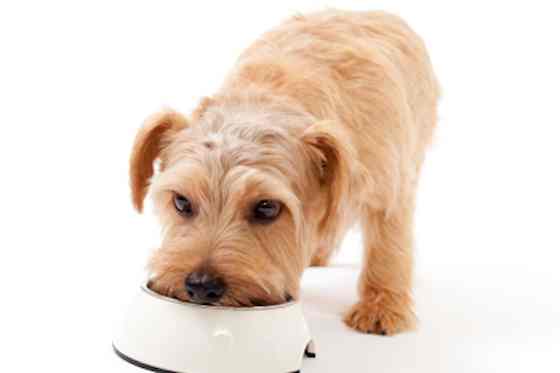- MENU
- HOME
- SEARCH
- WORLD
- MAIN
- AFRICA
- ASIA
- BALKANS
- EUROPE
- LATIN AMERICA
- MIDDLE EAST
- United Kingdom
- United States
- Argentina
- Australia
- Austria
- Benelux
- Brazil
- Canada
- China
- France
- Germany
- Greece
- Hungary
- India
- Indonesia
- Ireland
- Israel
- Italy
- Japan
- Korea
- Mexico
- New Zealand
- Pakistan
- Philippines
- Poland
- Russia
- South Africa
- Spain
- Taiwan
- Turkey
- USA
- BUSINESS
- WEALTH
- STOCKS
- TECH
- HEALTH
- LIFESTYLE
- ENTERTAINMENT
- SPORTS
- RSS
- iHaveNet.com: Pets
by Dr. Tracy Dewhirst

Dog owners ask me, "What do you feed your dog?" to which I reply "Which dog?"
You see, I have three dogs, and they each eat a different diet. This can make things a bit hectic at my house at feeding time. My young dog still needs a food designed for canine growth. My 3-year-old Miniature Schnauzer eats a maintenance diet. And my 13-year-old bird dog gets a senior food. Three different dogs, three individual bags of food.
There is not a one-size-fits-all food for dogs. That 50-pound bag of discounted dog food will not produce the same results for every dog in a household. Dogs with similar nutritional requirements might not be able to eat the same food with equal outcomes. The best food is the one that produces the best outcome for your dog. So when I recommend dog food, I consider these essentials to ensure he's getting the type and quantity of nutrients he needs.
The right food for the right stage.
Make sure the food has the adequate nutrients for your dog's life stage. You'll find several categories for healthy dogs, such as puppy, adult maintenance and senior foods. When you read the label, look for the first ingredient to be an animal protein source. Check for ingredients such as essential fatty acids and DHA for pregnant and lactating dogs and puppies. DHA also helps improve your dog's skin and coat. If your dog has a health condition such as diabetes or heart disease, check with your veterinarian about an appropriate diet.
The right caloric count.
The food also should suit your dog's lifestyle. Calorie consumption should match the dog's age and activity level. Young dogs that burn more energy will need more calories for their size than the less active middle-aged dog. Obesity causes numerous health problems -- including diabetes, orthopedic issues and cancer -- so calories do matter.
Adequate research.
Buy high-quality dog food from reputable companies that have a veterinary nutritionist formulate the diet and nutrients. Thousands of new foods hit the market every year. Look on the bag for a nutritional adequacy statement for AAFCO (Association of American Feed Control Officials), and see how the company validated that their diet is complete and balanced. A chemical analysis or feeding trial will validate. I prefer feeding trials because the product worked on a live animal. If you are interested in trying a new brand, call the company first and ask a few simple questions. Anyone working for the company should know the calorie count and who formulated the diet.
A taste test.
Palatability is important. No dog should have to eat just any kibble that lands in the bowl. If your dog does not act interested in feeding time or eats a few nibbles and then lies down or sulks off, it may be his way of telling you, "This kibble stinks." If so, try a different food and reduce the number of snacks being fed, so he won't be finicky.
Visible results.
The economics of feeding a dog (or multiple dogs) is such that owners should demand results. A good food should maintain your dog's energy levels, promote a nice shiny coat, create small- to medium-sized firm stool, and not cause bad breath or excessive flatulence.
AUTOS | HOBBIES | EDUCATION | FAMILY | FASHION | FOOD & RECIPES | HOME DECOR | RELATIONSHIPS | PARENTING | PETS | TRAVEL | WOMEN
PET STORIES and PET ARTICLES ...
- Is Your Dog Cut out for Field Trials?
- Should You Crate-train Your Puppy?
- How to Play Soccer With Your Dog
- The Best Way for Your Dog to Ride in the Car with You
- Good Dog Park Etiquette
- What Is Freestyle Dancing With Dogs?
- Canicross: An Easier Way to Run With Your Dog
- Reading Your Dog's Body Language
- Kitten Kindergarten
- Tips to Keep Your Dog Safe While Flying
- Keep Your Dog Warm in the Winter
- Scottish Deerhound: The Ideal Exercise Buddy
- Teach Your Dog to Fetch
- Is Your Dog Bored?
- 7 Ways to Pamper Your Cat
- The Best Games to Play With Your High-Energy Dog
- Dog Feeding Mishaps Corrected
- How to Succeed at Off-Leash Dog Play
- ID Your Relationship With Your Cat
- Photographing Your Elusive Feline
- How to Keep Your Pet Safe During the Holidays
- When Good Dogs Turn Bad
- From Finicky Fido to Chowhound Charlie
- Insure Your Kitty's Health
- Unconditional Love: My Cat Forgives Me Every Day
- From Feline to Family Member
- Is Water From a Christmas Tree Stand Harmful to Cats?
- A Day in the Life of a Sheepherding Dog
- Go on a Desert Retreat With Your Dog
- Dog Food Goes Natural and Holistic
- Determining a Food Allergy
- Exercise Gone to the Dogs
- Find the Right Sport for Your Dog
- Make Your Dog a Part of Your Wedding
- Hydrotherapy Helps Dogs Get in Shape
- How Your Cat Says 'I Love You'
- Lost Cats Found
- De-stress Veterinary Visits for Your Cat
- Keeping Cat Food Fresh
- Second-Hand Cat, First-Rate Pet
Copyright ©
Pets | Dogs: Is Your Dog Getting the Right Nutrients?